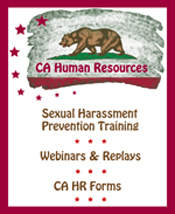How to Hire an Employee and Stay in Legal Compliance
Hiring your first employee can be an exciting and scary moment in the life of a business. Whether you have decided you need someone to assist you while you work or that you need an employee with talents different from your own, take this step into "employer-hood" carefully.
Being aware of your legal obligations and some basic common sense can make the transition of your status from entrepreneur to employer much easier.
Prior to Hiring Your First Employee
FEIN — If you don't already have one, apply for a Federal Employer Identification Number (FEIN) through the IRS (click here). This number is used a lot with IRS-related paperwork and for payroll purposes.
State Employer Number — You must also register with the state to set up an account for payroll taxes, unemployment, etc. Go online now to register.
Workers' Compensation Insurance — Talk with your business insurance broker about workers' compensation insurance. This is mandatory coverage that needs to be in place the day your first employee begins working. While we all hope there will not be any workplace accidents, an accident is just that... an unplanned event. If an accident should happen and you don't have this coverage, you will be financially responsible for all medical expenses related to an employee's work-related injury or illness. Plus, because this insurance is mandatory, you may be subject to fines and penalties.
Payroll — As you may have figured, employees want to be paid so you need to arrange payroll processing. Although it is possible to have your bookkeeper process your payroll, please use a true payroll processor. There are many such companies out there that specialize in this for varying prices. Your monthly price will be based on how frequently you plan to process payroll (weekly, biweekly, or semi-monthly). Keep in mind that hourly employees (in California) must be paid at least twice per month and within 10 days of the last day worked for which they are being paid.
Understand that wages are taken very seriously in California and you cannot postpone paychecks simply because the business is short on cash. Stop employees from working if you think there is even a possibility that you won't be able to meet the financial demands of payroll and taxes.
Bank Account — If you have a single business bank account, decide if you want a second one that will be used by the payroll company and other third parties. It's not legally required but may be advisable and now is the time to make that decision. If you do set up a second account, it is critical to keep it properly funded so payroll and tax payments don't bounce.
Applicant Testing — I'm an advocate of conducting pre-employment background tests and post-offer drug and alcohol screening. Many small companies pass on this because of the extra hiring expense. However, for the $90-$150 you might spend, you have the comfort of knowing you've done sufficient due diligence and have less concerns about your new employee. Wanting to test current employees is typically one of the major reasons companies want to implement this down the road but you will only be able to test new employees at that point. Make a decision now about whether or not this will be part of your hiring process.
Your Employee's First Day
New Hire Documentation — There are several mandatory state and federal forms you must give every new employee. Some are merely informational for the employee but the others need to be completed by the employee.
Employment Law Posters — You must post the state, Federal, and IWC posters in a conspicuous place and, if your employee won't be around the office, you need to get him/her the information in another way.
We would welcome the opportunity to help you!
Contact us and let's talk.
Contact us and let's talk.



